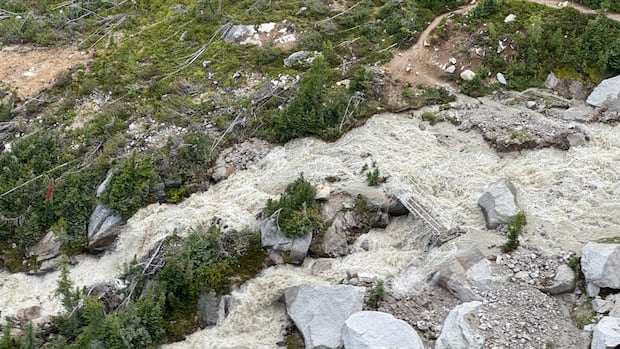Cost of Living9:37Why potholes are money pits
Dylan Langille is very familiar with the swerves it takes to dodge the potholes of Halifax.
“I could probably close my eyes on my commute back to my house, and I could avoid the pothole because they’ve been there for so long,” Langille told the Cost of Living.
“What are you supposed to do when there are potholes every 10 feet here.”
Langille, 30, is a radio announcer and content creator. He’s milked the pothole hate on his TikTok account, including attempting to fish and golf using local potholes.
“Just like putting on real green, I came up short,” he said.
Langille is one of many Canadian drivers who have to deal with potholes on a daily basis. It has municipalities spending millions on maintenance, and drivers making frequent trips to the mechanic.
But there are some new solutions emerging to this old and growing problem — from using artificial intelligence to monitor for the holes, to changing the road surface itself.
How the holes form
The main culprit for all the potholes in Canada is all the freezing and thawing roads go through, says Nemy Banthia, a professor of civil engineering at the University of British Columbia in Vancouver.
Moisture from rain and melting snow seeps under the road and freezes. That causes the ground to expand. When it gets warmer during the day, the ground shrinks back down, leaving a bulge in the road. Then, when people drive over it, it cracks.
“As the wheels go over it, they will take some of this broken off material and a pothole is formed, right there and there,” said Banthia.
If you need someone to blame for those pesky potholes that emerge in spring, look no farther than Mother Nature. The weather in Manitoba has a significant impact on how bad the roads will be when the temperature warms up. Watch CBC Manitoba weather specialist Riley Laychuk explain why.
And it’s getting worse, for a number of reasons. Banthia says that climate change has contributed to more of these rapid freeze and thaw cycles, and brought more intense rain.
Plus, there are about a million more registered vehicles in Canada now than six years ago.
“And we have not kept up on the innovation side to manage our pavements,” said Banthia.
What it costs
The economic impact of potholes is being felt across the country. According to a 2021 study published by the Canadian Automobile Association, Canadian drivers incur extra costs of $126 annually per vehicle because of poor road quality, which totals to $3 billion for Canadian drivers every year.
That includes vehicle repairs, higher maintenance, and other operating expenses, the study says.
And municipalities are paying big bucks, too.
In Edmonton, the city spent $5.9 million on pothole repair back in 2015. That budget is up to $11 million this year, which is the highest of any major city in Canada.
In 2024, crews repaired a total of 537,305 potholes. They’ve fixed 91,020 so far this year.

“I wouldn’t say that Edmonton is the pothole capital of Canada, but I think we probably are the pothole filling capital of Canada,” said city councillor Andrew Knack.
In Saskatoon, city crews repaired over 50,000 potholes in 2024, according to the City of Saskatoon’s Roadways Department. That’s 52 per cent more than the previous year.
But the increased cost isn’t just because there are more potholes. Materials and labour also cost more.
And Matthew Fair says it’s something that needs to be dealt with, and not just because it can come with a big bill. He is the head of maintenance operations in Durham, Ont., which means it’s his job to make sure the potholes get fixed.
“If you hit a large enough pothole, it’s public safety. Like you can lose control, it can cause an accident,” said Fair.
Can we fix it?
People have tried all sorts of clever ways to draw attention to the plight caused by potholes. In New Brunswick, a concerned citizen filled in holes with soil and flowers, which were promptly run over.
In the U.K., a British man built a pair of denim-clad wooden legs and erected them in the middle of a rain-filled hole.
In Durham, they use AI software called CityRover. Installed on a smartphone and mounted on the window of their maintenance vehicle, it can detect and log potholes that need fixing.

“If they are not detected and left too long, it can lead to larger, more expensive types of restorations to the roadway. So if we catch these potholes early, it saves us money in the long run,” said Fair.
But according to Banthia, there are long-term solutions too.
“We need to start building roads with more innovation in them so that not only these things last longer, they also have lower carbon footprint,” said Banthia.
He says one of those solutions is to create roads that are crack-resistant. In Surrey, B.C., they tried a more flexible type of pavement that will potentially last much longer.
Then there are what’s known as “self-healing roads” — a technology that might sound like science fiction, but it’s real, says Banthia.
He’s worked with Chawathil First Nation near Hope, B.C., and the village of Thondebhavi, in Karnataka, India, where they used a fibre-reinforced concrete that’s designed to fill in the cracks as they form, creating a more long lasting road.

The road in Thondebhavi was paved in 2015, and when Banthia went for a visit last year, he said the road was completely crack- and pothole-free.
Banthia hopes more places in Canada will apply some of these innovations. He understands that the first-time costs for these are higher, but he says it could save money long term.
“If we can actually do something so that we can not target just innovation but also make sure that our first-time costs are lower, I think that would actually make the technology far more attractive for the industry,” said Banthia.






